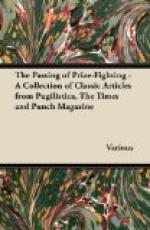“I think perhaps it is like the case of a crew or a team going out of training. They permit themselves a certain relaxation before they start training for the next contest. But I think too that there is something to be said for your reference to the Carmagnole. We are passing through a phase of Revolution, very natural after a great upheaval. The sense of freedom—the very thing for which we have been fighting—is apt to turn the heads of the young and thoughtless. There is a spirit of rebellion in the air, which at its worst takes the form of Bolshevism, but here is seen in a relatively harmless shape as a general revolt against social restriction, a general passion for what is known as ’a good time.’ In any case it is only a passing phase. Already there are signs of a reaction from this reaction; of a return to the decency of other days. They tell me, for a slight but significant indication, that the waltz is coming back; that we may even look to see a revival of the, minuet and pavane.”
“Then it is just a question of a cycle of vogues? We are to be swayed by recurring gusts of fashion, and not inspired by a fixed ideal.”
“Fashion counts with us, of course, for we are human and some of us are feminine. There was a fashion of patriotism as there is now a fashion of something that might easily be mistaken for its opposite. But the range of its influence is largely confined to a rather negligible element in London, the most provincial of capitals. The Press—and notably the Photographic Press—gives it a prominence out of all relation to its importance. The great majority are untouched by it. They talk little and they advertise less. But in a thousand quiet ways they are setting themselves to make good.”
“To make good money, you mean. Our world seems made up of profiteers and of those who would be profiteers but can’t, and so abuse those who can. Can you name to me a period when there was a wilder rush for wealth, or a more blatant display of luxury? Sometimes I wish the War back; England was at her best when the call for sacrifice came home to her. But how—we hear great talk of Reconstruction, but I am reminded rather of the Restoration.”
“My friend,” said the Sage, “I shall believe that this too is only a temporary phase. Memory is not our strong point, but you can perhaps throw back your mind to a year ago and recall how near we came to the ruin of our hopes. Victory took us by surprise; and we were less prepared for Peace at that moment than we ever had been for War. And, just as in the first days of the fighting we went astray, running after the cry, ‘Business-as-usual,’ so to-day we are making as bad a mistake when we run after ’Pleasure-as-usual’—or rather more than usual. But we soon revised that early error, and we shan’t waste much time about revising this. For though we lacked imagination then, and still lack it, we have the gift, perhaps even more useful if less showy, of common sense. And when common sense is found in natures that are honest and hearts that are clean it may make mistakes, but not for long.




